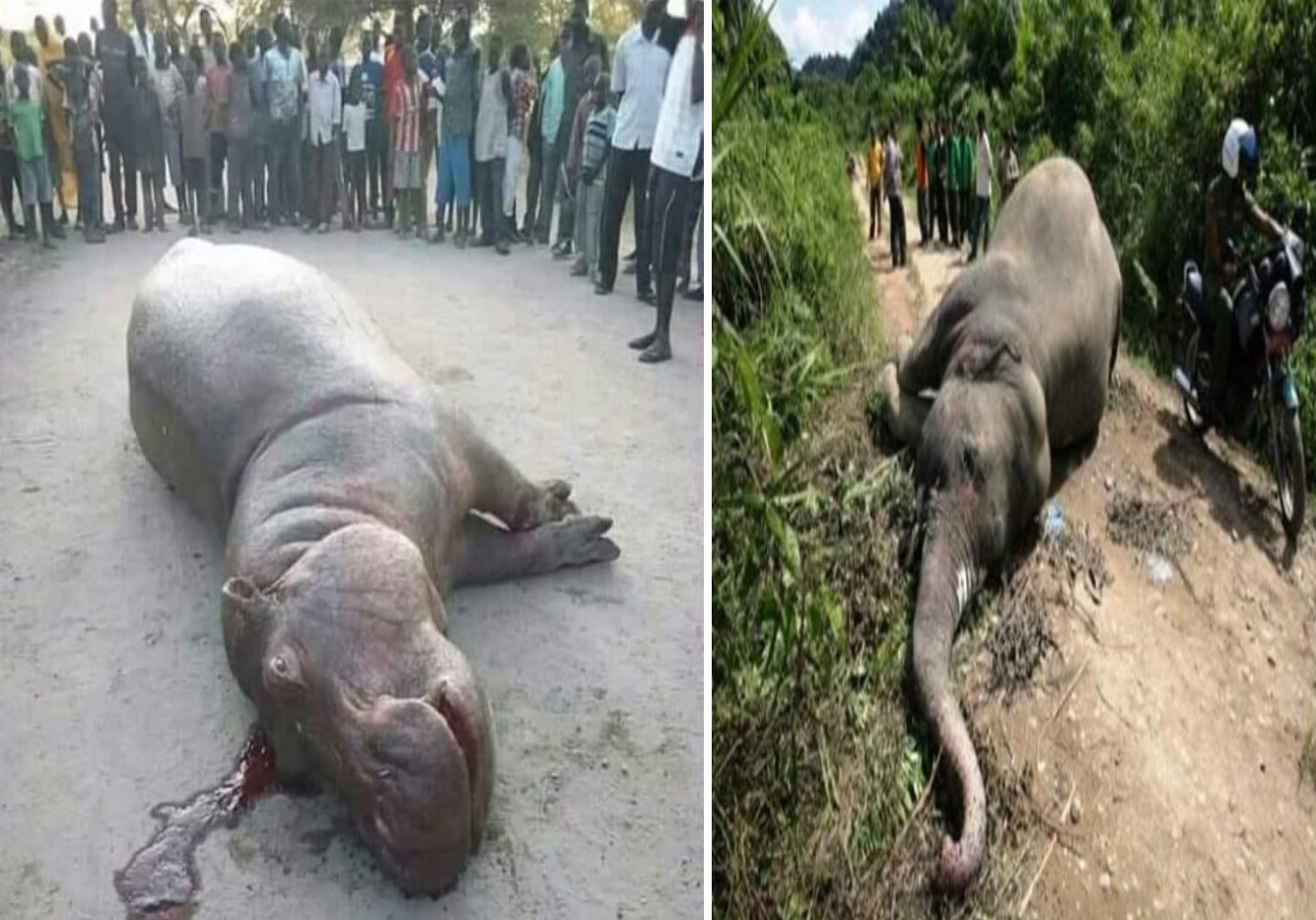By Moses R. Quollin, quollinmoses@gmail.com
(Environmental Journalist, Liberia Forest Media Watch LFMW) +231770922412/+231880922412
First, the photos above are those of a dead Pygmy Hippo killed around the Krahn-Grebo-Tai National Park and one of the four recently killed elephants in the Sapo National Park as was discovered without its tusks.
Despite huge international support to help protect Liberia’s wildlife and sustainable management of the forestry sector, Liberia is said to be continuously losing her unique species, mostly the critically endangered ones.
According to experts, recent observations showed that the country wildlife is under very serious threats, because of the continuous loss of habitats, the increasing high level of bush-meat consumption and pet trade—to some extend increase in the Asian Community in Liberia.
International reports say Asians countries are among the major illegal exporters of wildlife from West Africa’s forests; an international crime that affects the West African basin, made many unique species to go extinct.
Liberia, which accounts for the largest portion (42%) of the upper Guinea Forest, is now considered as the hotspot of illegal exportation of wildlife either as pet-trade or bush-meat consumption purposes.
A mini investigation conducted by the Liberia Forest Media Watch—a local biodiversity, forest & wildlife reporters network uncovered those major forest areas in the north western and south eastern areas of the country—where the important species are.
On the other hand, the Forestry Development Authority, which complains of low or limited budgetary and logistical supports is making some strives as the country grappled with wildlife poachers.
Liberia’s rich biodiversity has gained well deserved attention from the local, regional and international conservation community and is considered one of the most critical remaining intact habitats for different types of spices around the world.
“FDA has very effectively joined forces with local and international partners to ensure that Liberia’s Wildlife Conservation and Protected Area Management Law is understood, strengthened and enforced. Combatting illegal wildlife crime throughout the country and the region is a top priority for FDA and her partners.” An FDA release said following the end of a September conference highlighting the status of the Western chimpanzee and other species’ threats.
But, it is alleged that FDA, in the same vain undermines her own efforts by ‘uncontrollably’ issuing licenses to commercial logging companies and even certificating forest communities ‘without’ proper completion of the Nine (9) Steps as enshrined by the forestry’s laws, a claim FDA’s technical manager for community forestry, Atty. Gertrude Nyanley has consistently denied.
“In other cases like San Gben, Kulu Shaw Boe, Toto Duo and others, it is observed that Community Forests directly overlapped with biodiversity hotspots,” An international conservationist (name withheld) told this medium.
Hunting activities are uncontrolled and unregulated and the dimension of Illegal Wildlife Trade, i.e. the illegal trade of life animals or of their parts, is rapidly growing, especially putting threatened species at the risk of extinction, such as the West African chimpanzee, pangolins, forest elephants and various duikers and primate species.
Limited education about the National Wildlife Conservation and Protected Area Management Law has over the years place the country forests and their wildlife under immense threat.
“Even some judges and magistrates are not aware of the law [Wildlife Conservation and Protected Areas Management], FDA’s Boss C. Mike Doyan told journalists in February during an EU funded 1.5M project launch: Strengthening Local Communities and the Law Enforcement Network to combat Wildlife and Forest Crime in Liberia through the Wild Chimpanzee Foundation.
“Many Liberians, including government officials are still trading, hunting and eating bush-meats, and keeping wild animals; something which are against the law,” a conservationist recently observed whilst on a visiting mission to Liberia.
“Deforestation is rising. Wildlife are endangered. The Sarpo National Park and the Gola National Forest are threatened. Forest Resources are abused. Licenses are issued to bogus logging companies. Host communities are denied their just benefits. The conservation of our ecosystem is of less priority…” Youth and Student Activist, Martin K. N Kollie charged FDA’s Boss in series of article.
However, Abednego Gbaway, wildlife manager takes exceptions to some of those allegations noting the government, through the FDA along with its partners, has made some significant gains despite the “daunting challenges” that engulfed his entity.
Apart from awareness done in Monrovia, Abednego Gbaway said some biodiversity or conservation organizations have been able to successful train local dwellers around the national parks and other protected areas in the country, raising awareness, community Eco-guard programs, and among others.
Unconfirmed reports, allegations within the corridor of the Liberia Forest Media Watch say some logging companies working mostly within the southeast are largely operating wild animals’ death traps for sole purpose of bush-meat trade in large quantities as well.
Another survey places many middle class food centers in and round Monrovia, including foreign-owned (Chinese and others) restaurants in a category of those supporting the hunting of bush meats—by means of buying and selling for food.
FDA’s communication manger Shelton F. Gonkarwon told this institution that the government has been over to adjudicate about three (3) to four (4) cases where culprits are being prosecuted.
Despite recent media reports of killing elephants, hippopotamus and other endangered species, it is also observed that too many poachers have again invaded almost all of the protected areas, national parks and proposed reserves as means of daily survivals.

